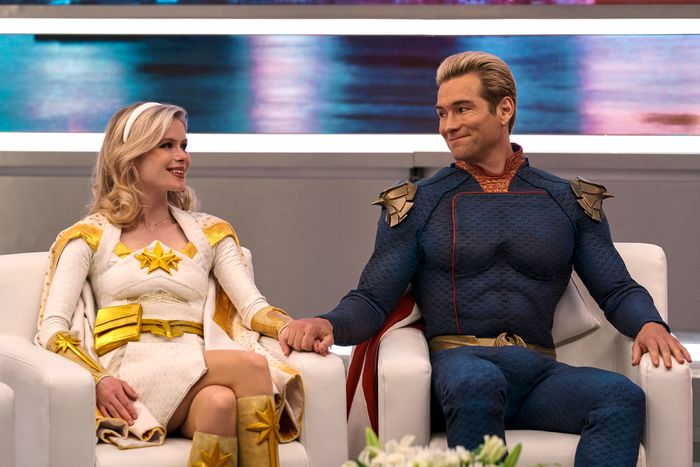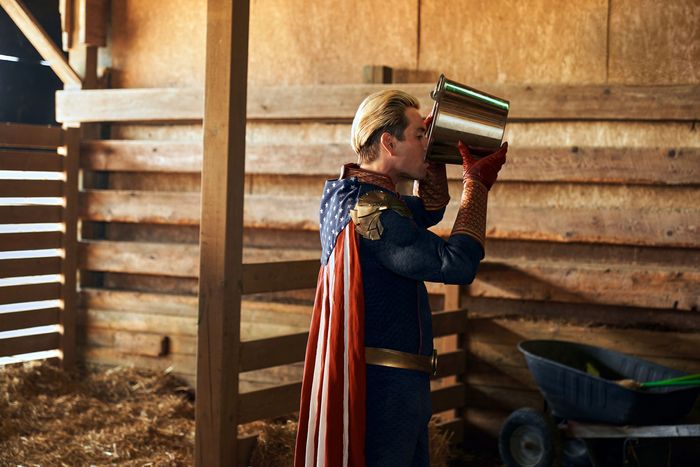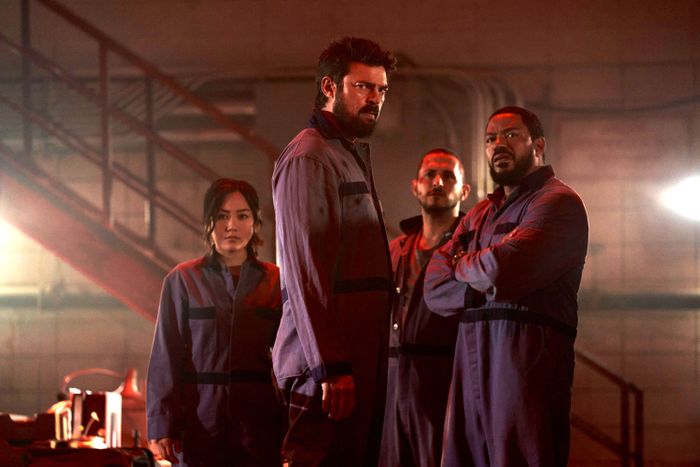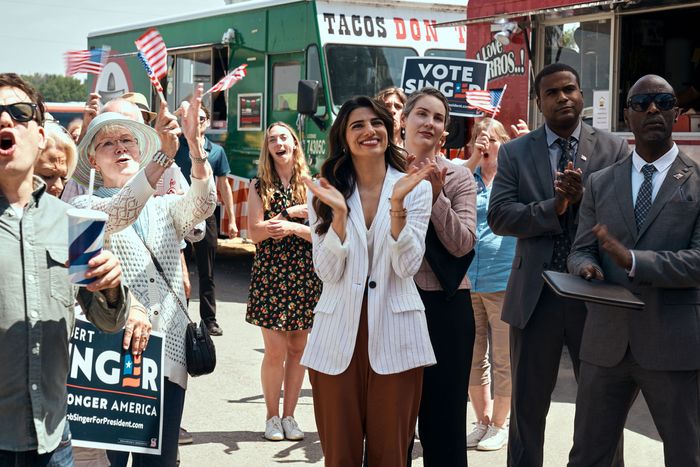
Spoilers follow for the third season of The Boys.
“That’s how Americans do it,” a Homelander supporter triumphantly yells after the leader of the Seven impulsively murders a man for insulting him and his supe son Ryan. The entire third season of The Boys has been defined by similar moments of masks-off political satire. While the first season was primarily interested in broadly skewering the superhero monopoly that has overwhelmed pop culture thanks to the Marvel Cinematic Universe and the DC Extended Universe, season two’s introduction of the Alexandria Ocasio-Cortez–esque Victoria Neuman and Nazi reveal of Seven member Stormfront signaled a marked shift toward politics and social issues. The military-industrial complex was already being mocked, so why not American democracy, capitalism, and religions like Scientology and Evangelical Christianity, too?
All of that built up to a third season that repeatedly centered political elements in a narrative that doesn’t quite feel like it’s about superheroes anymore. Instead, these eight episodes of The Boys primarily focused on the corruptive influence of unchecked power, which is a fine subject to tackle — unless the best you can manage is an anemic “both sides bad” ideology that parrots recognizable character types, beliefs, and recent real-world events without illuminating them in a deeper way.
Homelander stood in for Donald Trump as a megalomaniac convinced that he could run the biggest corporation in the world, that he was being persecuted by critics, and that his physical attributes made him better than others. Soldier Boy personified COVID, with Homelander urging Americans to ignore the threat posed by the newly released supe and keep frequenting restaurants and movie theaters. The Boys were essentially the feckless Democrats, too scared to “go low” in order to effectively fight their enemies. And at the end of this season, we reset again to a dynamic in which Homelander was in power and the Boys in a weaker position, with seemingly no way for the latter to bridge the gap with the former. What is The Boys trying to say about the political system in which we live and whether democracy dies in darkness, or whatever? And what could this mean for future seasons? Let’s attempt to untangle some of this.
.
Is Homelander just Trump now?
“I could stand in the middle of Fifth Avenue and shoot somebody, and I wouldn’t lose voters,” Trump famously said on the presidential-campaign trail in January 2016, and The Boys adapts that hypothetical for Homelander’s closing moments in finale episode “The Instant White-Hot Wild.” Where Homelander had once been a spin on an evil Superman (and it’s sort of amusing that a certain subset of fans seemingly had no problem with this before the series got explicitly political), this third season puts him firmly in the Donald’s shoes. Without anyone to temper or say no to him, he’s a blowhard who doesn’t know what he doesn’t know but clings to any power he can and correctly understands the importance of maintaining his omnipresence on sympathetic news networks. The man doesn’t have allies so much as he has underlings, and various moments of Homelander’s arc this season — in particular, his brushing off of the Soldier Boy threat, essentially ignoring someone who could damage public health — seem pulled directly from the Trump presidency.
The issue here is how predictable this made Homelander, from his attempts to run Vought on his own to his smugly sneering on the Vought News Network to that final murder of a citizen in a crowd of cheering fans, which doesn’t open up a lot of narrative avenues for Homelander in future seasons. If we stay with Homelander-as-Trump, does that mean the character decamps to Florida after a fight with Ryan or whenever he gets pouty? Could The Boys get extra-literal and have Homelander run for president? Homelander was most intriguing when his combination of insecurity and superiority made him a wild card, and it would be nice to go back to that instead of whatever this is.
.
Does Soldier Boy get shuffled off the board because he’s COVID?
The more I think about how The Boys used Soldier Boy this season, the more I’m confused by it. First, he was positioned as a COVID stand-in: this dangerous, insidious force who can harm a bunch of people at once via his radioactive energy, and whom Homelander tries to diminish because to acknowledge the danger he poses would signal Homelander himself is weak. But then there’s the late-season reveal that Soldier Boy is Homelander’s father (a very major change from the original comics) and the suggestion that his brutality, sexism, and racism are somehow worse than Homelander’s own because Soldier Boy lacks his son’s insecurity and desire for love and adoration. (The Boys’ obsession with paternal lineage really got out of control this season, between Butcher’s dad/older brother dynamic with Hughie, MM’s memories of his father’s downfall, Ryan’s being caught between Butcher and Homelander, and Homelander’s securing Ryan on his side and trying to sway Soldier Boy, too.) By tying Soldier Boy so much to Homelander and MM — totally rewriting the latter’s backstory from the comic books — The Boys made this character “just another racist piece of shit we can’t seem to get rid of,” as MM said.
But again: What else? Because Soldier Boy serves as both a representation of COVID and a manifestation of how Homelander could be worse, there’s not much room for the character to do his own thing in the present-day storyline. And by the end of the season, when the greater public seems to have shrugged off the threat of Soldier Boy — much like COVID was ignored by a sizable segment of the American population and then normalized by others — the character’s function seems to disappear. Suddenly shuffling off Soldier Boy into another metal tube governed by the CIA felt odd, as if The Boys didn’t know how to keep incorporating the character, but perhaps that’s because they weighed him down with Homelander’s baggage instead of letting him stand alone.
.
Are the Boys so ineffective because they’re “We go high” Democrats?
What if this whole season of The Boys were really the series subtweeting the Democrats for being so ineffective? That is a hot take, but I am standing by it!
Butcher’s team is repeatedly useless, even when it seemingly has the upper hand, and it perpetually backs away from the kind of ruthlessness required to get rid of someone like Homelander. Sure, Butcher wants to protect Ryan, and sure, they don’t want employees at Vought Tower to die. But their inability to sacrifice in service of the bigger picture also means the Boys keep losing. When MM asks Starlight, “Why do I always have to take the high road?,” that is a valid complaint. The people they’re fighting don’t! When Hughie says of saving Butcher, “We save everyone, even if they don’t deserve it. Especially if they don’t deserve it,” that explains why their success ratio is so low! Vought and Homelander don’t concern themselves with this kind of thing, and it has helped them maintain power.
It would be nice if The Boys could allow for some kind of incremental progress by the Boys against Vought and Homelander because it would finally feel like there were some stakes to this story. What if Victoria, instead of aligning herself with Homelander, used her head-exploding skills against him rather than on his behalf? What if Temporary Compound V didn’t cause cancer in people who used it and instead was a legitimate weapon Butcher and Hughie could use more permanently, as it is in the comics? The Boys has become stuck in a pattern in which the group simply cannot win, and that lack of forward momentum is becoming increasingly frustrating to watch, even if it feels similar to our current political hellscape.
.
Is Victoria Neuman still supposed to be AOC?
What is the purpose of Victoria Neuman, truly? She was very clearly presented as an AOC analog in season two, someone who would stand up against Vought and CEO Stan Edgar, serve as a progressive voice, and spearhead public criticism of the unparalleled grasp Vought seems to have over both the American military and American pop culture. Those are all major changes from the character Vic Neuman in the comics, whom writer Garth Ennis created as an extreme parody of former President George W. Bush — and it’s sort of dispiriting, actually, that The Boys would equate the two. There is validity to the argument that at the highest levels, politicians protect one another irrespective of party affiliation, but introducing a character who looks and acts like AOC, then making her a stooge of the most evil corporation in the country, then making them sell out their beliefs to align with No. 1 enemy Homelander takes a special level of cynical. (From a narrative perspective, how did no journalist ever realize that Neuman was Edgar’s adopted daughter? Both of them are major public figures; someone absolutely would have figured it out.) Now Neuman is running for vice-president, and Butcher’s last line this season is about her: “That bitch has definitely gotta go.” But the idea that she’s more of a target than Homelander doesn’t exactly track, unless The Boys is trying to say something about how the Establishment is all complicit. If so, making your AOC character the face of that Establishment is certainly a choice.
.
Where does The Boys go from here?
Who can say! Many things about this season surprised me: the rapidity with which the use of Temporary Compound V was introduced and then abandoned; that Starlight would continue to date Hughie when he was so annoyingly toxic and overprotective; all the times MM and Frenchie went back to Butcher after he betrayed them; the series’ inability to find something for Kimiko to do. And while this season’s political angle never felt as creative or insightful as The Boys seemed to think it was, Antony Starr certainly sold everything he was asked to do as Homelander, especially his final shocked turned delighted smile after his loving fans accept his in-broad-daylight murder. It’s impossible to tell what the series will do with Victoria and Dakota Bob, since their characterizations don’t really go past “opportunistic and amoral.” But if that closing shot of Ryan mimicking his father’s expression and going from hesitant to elated is any indication of where The Boys is headed, maybe the series sticks with fathers and sons and incorporates generational privilege in there, too? Only time will tell whether Ryan is more of an Eric or a Donald Jr.





